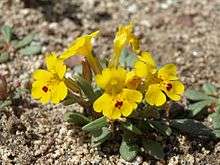Erythranthe carsonensis
Erythranthe carsonensis is a species of monkeyflower known by the common name Carson Valley monkeyflower.
| Erythranthe carsonensis | |
|---|---|
 | |
| Scientific classification | |
| Kingdom: | Plantae |
| Clade: | Tracheophytes |
| Clade: | Angiosperms |
| Clade: | Eudicots |
| Clade: | Asterids |
| Order: | Lamiales |
| Family: | Phrymaceae |
| Genus: | Erythranthe |
| Species: | E. carsonensis |
| Binomial name | |
| Erythranthe carsonensis N.S.Fraga | |
Distribution
It is native to Nevada and California, where its range is restricted to three valleys (Carson, Eagle, and Washoe Valleys) and the surrounding foothills. Its preferred habitat is dry, sandy soils in sagebrush and bitterbrush vegetation.
Description
An annual species, 2 to 10 cm tall, bearing 1 to 20 yellow flowers. The flower is typically 0.5 to 1 inch wide, yellow with yellow hairs and tiny red dots on the palate and a large red dot on the lower limb.[1] In small plants, the flower is often larger than the leaves and stem.
Sereno Watson first described this species as "A pretty dwarf flower of earliest spring, forming bright patches of color among the sage-brush in the lower valleys, the delicate inch-long stem seeming scarce able to sustain the absurdly disproportionate flowers that terminate it. Carson Valley, Nevada ; April."[2]
Taxonomy
Erythranthe carsonensis was separated from Erythranthe montioides in 2012 based on morphological and habitat differences.[1][3]
References
- Fraga, Naomi (2012). "A Revision of Erythranthe montioides and Erythranthe palmeri (Phrymaceae), with Descriptions of Five New Species from California and Nevada, USA" (PDF). Aliso. 30: 49–68.
- Eaton, Daniel Cady; Watson, Sereno (1871-01-01). Botany /by Sereno Watson, aided by Daniel C. Eaton, and others. Washington, D.C. : G.P.O.
- Barker, W. L. (Bill); et al. (2012). "A Taxonomic Conspectus of Phyrmaceae: A Narrowed Circumscription for MIMULUS, New and Resurrected Genera, and New Names and Combinations" (PDF). Phytoneuron. 39: 1–60. ISSN 2153-733X.